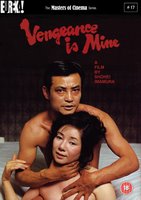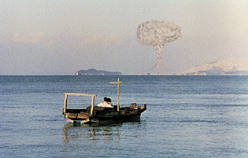 It's a little pricey and won't be released until after my b-day, but I won't mind if you don't mind. Also, Douglas Sirk. Thanks.
It's a little pricey and won't be released until after my b-day, but I won't mind if you don't mind. Also, Douglas Sirk. Thanks.* Nerve's recently launched movie news blog Screengrab is edited by cinebud Bilge Ebiri. In format, this blog is like the indispensable Greencine Daily, but more irreverent and funny (though far less comprehensive). The only annoying thing is that you have to be a Nerve subscriber to comment. But you don't have to subscribe in order to bookmark the page.
*
 Okay, "objectively" Brett Ratner's comic book extravaganza isn't really comparable to Claire Denis' poetic reverie on mortality and regret, L'intrus. So why the same grade? For one thing, I fell asleep watching L'intrus (though the parts I managed to stay awake for were indeed magnificent if puzzling). For another, Hugh Jackman, besides being a foot taller than the "real" Wolverine, is exactly how I had always pictured the Canadian mutant. Dude's perfect. And the script managed to compress a bunch of X-Men story threads (including the canonical Dark Phoenix saga) into one taut and accessible narrative that didn't betray the spirit of the original stories. All worth some props. But mainly I liked this movie because Madrox the Multiple Man made a surprise appearance (as a bad guy). This was especially awesome since I had ruminated on this obscure, useless but nonetheless awesome character the night before in a discussion on dating.
Okay, "objectively" Brett Ratner's comic book extravaganza isn't really comparable to Claire Denis' poetic reverie on mortality and regret, L'intrus. So why the same grade? For one thing, I fell asleep watching L'intrus (though the parts I managed to stay awake for were indeed magnificent if puzzling). For another, Hugh Jackman, besides being a foot taller than the "real" Wolverine, is exactly how I had always pictured the Canadian mutant. Dude's perfect. And the script managed to compress a bunch of X-Men story threads (including the canonical Dark Phoenix saga) into one taut and accessible narrative that didn't betray the spirit of the original stories. All worth some props. But mainly I liked this movie because Madrox the Multiple Man made a surprise appearance (as a bad guy). This was especially awesome since I had ruminated on this obscure, useless but nonetheless awesome character the night before in a discussion on dating.* You can now find the answer for every question you've ever had on Wikipedia. For example, I now finally understand what the fuck "he is teh crap" means in reference to crappy Sox pitcher Matt Clement (why teh fuck did you not offer Pedro five years, Theo? Why?).
* Following some links from the entry on pwn3d in Wikipedia, I eventually discovered the amusing if unconvincing entry on "Nice Guy Syndrome". Is it me or has pop psychologizing of romantic rituals become the new American pasttime? Witness, for example, the Washington Post's 4 page examination of that all-important role, the wingman.
* During my blogging hiatus, I spent a lot of time commenting on other blogs, mainly about politics and especially about the role of the blogosphere. (Look! LA Times columnist Jonathan Chait gave me props (actually it's buried deep in the comments section, so don't bother).) I had been trying to work my thoughts into a post, but Josh Marshall kinda did it for me (and pretty much voiced my own thoughts on both Jeffrey Goldberg's New Yorker piece on the Democrats and the New Yorker in general).
Short version: the blogosphere cannot win elections, but it's serving a valuable function in creating alternative narratives and puncturing stupid conventional wisdom. Also, most people who follow the blogosphere understand that the liberal side is not especially ideological -- it's combative and partisan, but doesn't demand litmus tests, contrary to the bullshit "responsible centrists v. nutty activist bloggers" memes perpetuated by clueless pundits. (Centrists like Brian Schweitzer and Mark Warner are blog darlings; Lieberman is hated not because he's a centrist, but because he can't help but "parrot right-wing talking points" about Democrats while kissing Bush's ass.) The problem with the blogs is (1) insularity; (2) overinflates the crime of "transcribing right-wing talking point" or "MSM meme", which I guess can't be helped when the main goal is to provide an alternative narrative;(3) self-importance; and (4) irritating and shrill. Some blogosphere developments, such as the inexplicable worship of nutcase dKos diarist Mary Scott O'Connor, are indeed pretty lame. But the liberal blogosphere is the response to right-wing talk radio; by itself, it can't change politics. In attacking the Democrats' timid, consultant-driven approach, though, it's changing Dem tactics, mostly for the better.

* But the blogs can't do anything about California. What if, in the biggest blue state of them all, you held a Dem primary election for governor and nobody cared? $50 million spent on ads, and still nobody gives a hoot about the colorless monkeys Westly and Angelides.
* One of the best political ideas in the history of the republic.


